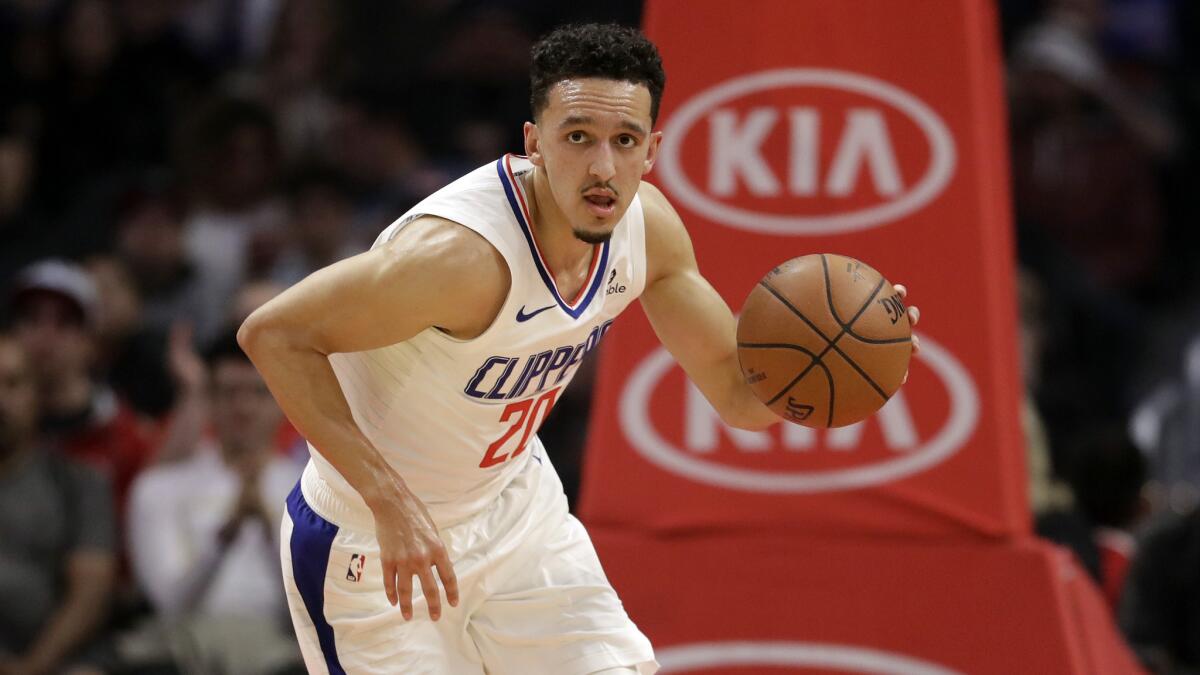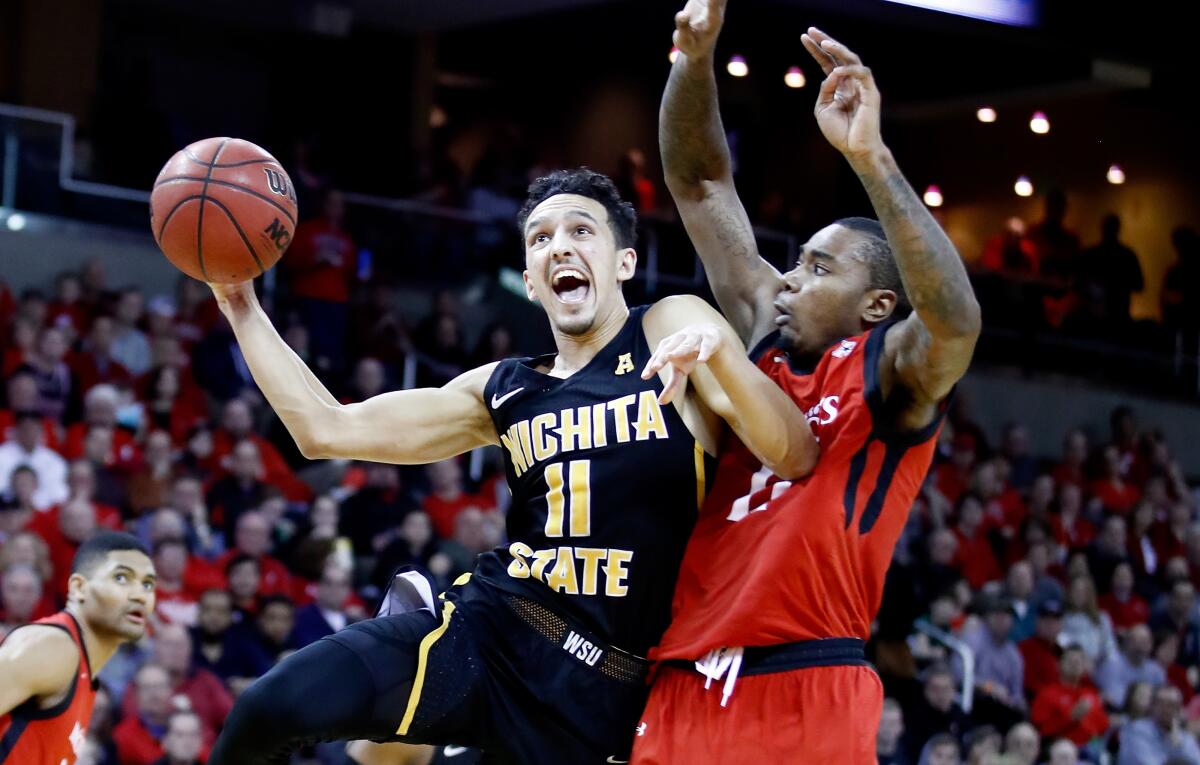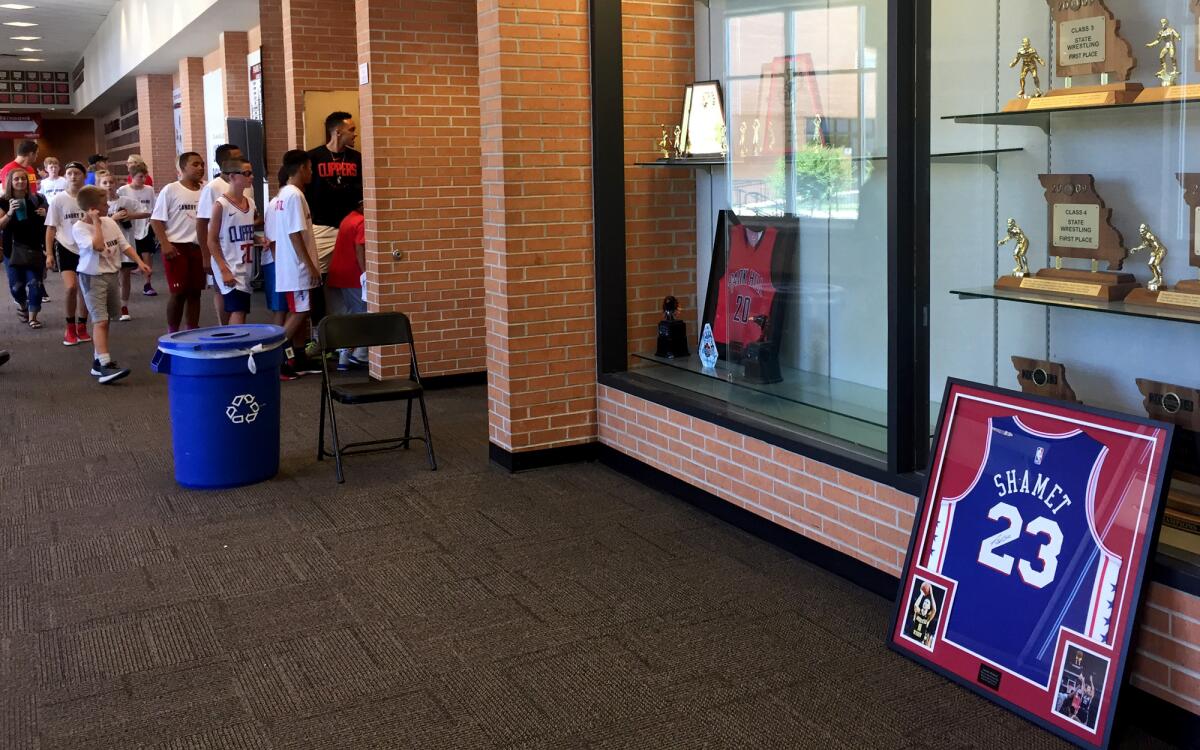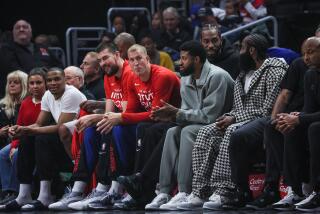Landry Shamet’s path to NBA began with strong family ties

KANSAS CITY, Mo. — As soon as the doors of Park Hill High School’s gymnasium were unlocked on a 75-degree July morning, the first attendees of Landry Shamet’s sold-out basketball camp streamed through.
Some wore Clippers gear. Others carried basketballs. Everyone craned their necks to get a glimpse of the hometown star who, in just the last year, had gone from a first-round pick in Philadelphia seemingly bound for the G League into a Clippers starter with All-Rookie honors, and a game-winning three-pointer in the playoffs, to his name.
If campers had signed up to emulate Shamet, they were partly in luck. Counselors taught shooting form and preached hustle. Each huddle ended with a cry of Shamet’s mantra: “Never cheated.”
But not everything that explained his rookie success could be taught in a two-day camp.
“Landry,” said David Garrison, Shamet’s high school coach at Park Hill, “has always been wise beyond his years.”
For the Clippers to claim their first NBA Finals berth this season, they will need superstar performances from Kawhi Leonard and Paul George. But a title run will also require something extra from the Clippers’ role players. They include Shamet, a 22-year-old starting guard of whom much will be asked , in only his second season.
Yet Shamet has grown up quickly before. The only son of a single mother took on responsibilities that seemed beyond his age well before he reached the NBA.
At 2, Shamet could dribble a regulation-sized basketball the length of a court. By 8, when his mother’s work shifts ran long, he was letting himself into the back door at home after school using a key worn around his neck. In middle school, his family lost its duplex to bankruptcy. In high school, he was confronted with the stunning choice whether or not to contact the father he has never known.
“Learning how to take care of yourself,” Shamet said. “I was doing that since I was in first, second grade. Having responsibilities, being held accountable, the whole thing.”
Coaches and teammates trace a direct line from Shamet’s dependability as a pro to his upbringing — a childhood in which he quickly learned to depend on the team around him.
“The village that was there for him,” said his grandmother, Patti Shamet, “when times were hard.”
::
Twenty-five years before her son’s all-state basketball plaque was installed outside Park Hill’s gymnasium, Melanie Shamet had one of her own added.
In 1989, she was one of Missouri’s top volleyball players. But soon after she arrived at Boise State on scholarship, she washed out academically. An aimlessness that derailed her college career followed her back to Park Hill, a suburb 25 minutes north of Kansas City’s downtown, where high-income families mix with blue-collar workers and pine trees line wide avenues.
When Melanie became pregnant, it was unplanned. And a jolt.
“Landry saved me,” she said.
She created ground rules. Honesty was nonnegotiable. They needed to stick together.
“Single mom, biracial child, no dad,” Melanie said. “I knew that I had to make sure that he could come to me — with anything.”
Her son grew up knowing he could turn to others too.
They lived with her parents, Dennis and Patti, until Landry was 4. When he was older, they briefly lived with his aunt, Janell, too. His uncle, Tyler, became a de facto older brother. His grandfather taught Landry to keep his right elbow in on his jump shots. When Melanie pulled graveyard and swing shifts at Harrah’s hotel casino in North Kansas City, his grandmother and great-grandmother watched over Landry.
As the family insulated Landry, a wider network grew around them as he became a sports star.
When Melanie didn’t know how she would pay to fly to an AAU basketball tournament in Las Vegas, friends booked the flight using their air miles. Another family friend sponsored a season of travel baseball.
The support allowed Landry to focus on sports. When other Park Hill athletes went home after practice, teammates noticed Shamet lifting weights before heading to another practice, often with the AAU Pumas, a club he joined in fourth grade.
“He always knew what he kind of wanted to do,” said Jamaal Brazil, a Park Hill teammate.
As a child, Shamet is remembered as being unusually empathetic of others, especially younger kids. At his grandmother’s daycare, he let younger children climb on his back and pretend they were cowboys riding a horse. He took an interest in classmates with few friends.
Yet on the court, he could be unrelenting toward himself.
“People who know me know I will point out the negatives a lot easier than the positives,” he said. “I remember things, hang onto things.”
As he has grown older, he has learned to channel his self-criticism into motivation, but it took trial and error to know what to hang on to and what to let go.
During rides home after poor games, he refused conversation and offers of food. In high school, Garrison was surprised to find Shamet in his office after a tournament, apologizing for not playing up to his potential.
Shamet’s breakout at Park Hill came during his junior year, when he took over a game that college coaches had attended to watch Kevin Puryear, a highly rated forward on the opposing team, Blue Springs South. That put the 6-foot-4 Shamet, who’d grown four inches between his freshman and sophomore seasons, on the radar of schools like Wichita State, where he became an All-American in 2018. But it burned that his high school credentials weren’t enough to draw the attention of Kansas, the dream school whose camps he’d attended as a kid.
Shamet’s intensity surprised even his friends. He had been overlooked before and did not want it to happen with the NBA.

After one game at Wichita State, he stormed out of the locker room after a poor shooting night. Brett Barney didn’t know where Shamet, his teammate and roommate, had gone until he walked back toward the Shockers’ court.
“He’s out there in his jersey still an hour after the game,” Barney said. “He had a manager rebound for him and he was shooting. I went home. He didn’t get home until midnight, and the game ended at 10.”
::
When Landry was in middle school, his mother sold their house in North Kansas City and bought a duplex in Park Hill, one block from her parents’ house and inside a school district known for its high test scores and involved parents.
The mortgage made their budget tighter, but the situation felt ideal. Her schedule still left her working past 11 p.m. on many nights. But Landry ate dinner and finished his homework at her parents’ house down the street and took care of himself from there.
“About eight o’clock it’d come time for bed,” his grandmother, Patti, said. “He would walk a block over to his house, shower and put himself to bed until she came home.”
A few months after moving in, a notice came in the mail that informed Melanie that a mistake had been made in escrow during the purchase. Her mortgage was increasing nearly $300 per month. Her budget’s margins vanished.
“Paycheck to paycheck, robbing Peter to pay Paul,” Melanie said. “Land would go to sleep and I’d just bawl. I didn’t know how I was going to do it.”
When she filed for Chapter 7 bankruptcy three years later, with her son in eighth grade, the family’s network rallied. They moved in with Melanie’s parents until they found an apartment. Friends delivered gift cards for Hy-Vee groceries.
Things stabilized, until the next jolt.
Browsing Facebook while Landry was in high school, Melanie found his father. It was a subject they’d rarely talked about.
“I at least wanted him to know he had the opportunity if he wanted me to reach out,” Melanie said.
“I felt emotions I can’t even describe,” Landry said. “Just kind of seeing his face and, I don’t know … it was crazy.”
His answer was no.
He doesn’t rule out one day making the connection. Yet Shamet keeps a small circle of friends and family. And that village, he said, is all he needs.
“They’ve done an incredible job filling that void,” he said. “My mom and I get along great. We went through some … or whatever coming up like any family does. You go through some struggles. There’s no father in this situation. But I wasn’t longing for my dad.”
::
At the end of the second and final day of Shamet’s basketball camp, parents and families streamed through Park Hill’s doors. Outside the gymnasium, workers installed his framed NBA jersey in a trophy case next to Shamet’s framed Park Hill jersey.
Inside, a scrimmage between middle school-aged campers and counselors had reached sudden death. A camper dribbled left, stepped behind the three-point line near the top of its arc and shot over Shamet, who’d elected not to contest the shot. The ball went in. Campers surrounded the shooter, chanting “MVP!”

Standing in the back next to her sister and mother, Melanie smiled at the upset. She had taken the day off to help her sister organize camp logistics. She still works at Harrah’s and lives not far away, in a house whose down payment Landry helped make.
The 142 campers eventually calmed down and sat cross-legged on the floor. As Shamet stood to speak, they leaned in.
“I remember being you,” Shamet said. “I had dreams of being in college, in the NBA. It doesn’t seem that far off. My message to you, just go make it happen.”
Then he turned to acknowledge those who had helped him make it happen.
One by one, he called his aunt, grandmother and mother to the front of the gym and handed each a bouquet of roses.
::
UP NEXT
VS. GOLDEN STATE
When: 7:30 p.m.
On the air: TV-TNT; Radio-570.
Update: After playing the final regular-season game in the Warriors’ former Oakland home, Oracle Arena, the Clippers return to the Bay Area to face the Warriors in the regular-season debut of Chase Center, the team’s new arena in San Francisco. With Kevin Durant (signed with Brooklyn in free agency) and Klay Thompson (recovery from a knee injury) no longer in the Warriors’ starting lineup, Stephen Curry averaged nearly 27 points a game during the preseason as his team’s lone, established option. Coach Steve Kerr is also working offseason addition D’Angelo Russell into the offensive scheme. He averaged 18 points in four preseason appearances. ... The NBA fined Clippers guard Patrick Beverley $25,000 for throwing the basketball into the stands at the conclusion of a 112-102 victory over the Lakers on Tuesday night.
More to Read
Get our high school sports newsletter
Prep Rally is devoted to the SoCal high school sports experience, bringing you scores, stories and a behind-the-scenes look at what makes prep sports so popular.
You may occasionally receive promotional content from the Los Angeles Times.







